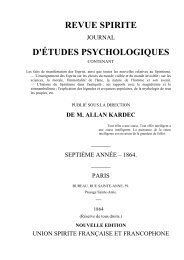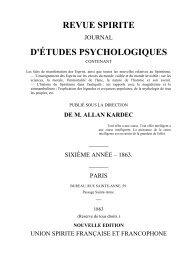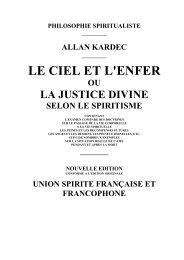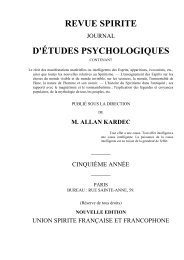PDF version - Geae
PDF version - Geae
PDF version - Geae
You also want an ePaper? Increase the reach of your titles
YUMPU automatically turns print PDFs into web optimized ePapers that Google loves.
CHAPTER XXVI<br />
SORROW<br />
All living things suffer on earth – animals and men. Nevertheless, love is the law of the universe, and<br />
by love God formed beings. A formidable contradiction in appearance, an agonizing problem which has<br />
troubled many thinkers and carried them to doubt and pessimism.<br />
The animal is subjected to an ardent battle for life. Among the herbs of the prairie, under the leaves in<br />
the woods, in the air, in the bosom of the waters, everywhere unknown dramas are enacted. In our cities,<br />
inoffensive beasts are continually sacrificed to human needs, or delivered to laboratories for the torture of<br />
vivisection. As for humanity, its history is one long martyrdom. Through time, and over the centuries, rises the<br />
sad miserere of human suffering. The plaint of the unhappy mounts with the regularity of an ocean wave, and<br />
with a heart-breaking intensity. Sorrow follows in the path of each of us and watches all our detours, and<br />
before the sphinx who fixes upon him her strange look, man asks the eternal question, ‘Why is sorrow?’ Is it a<br />
punishment – an expiation? Is it a reparation for the past – a ransom for faults committed? At the foundation,<br />
sorrow is only a law of education and equilibrium. Without doubt the faults of the past fall upon us with all<br />
their burdens, and determine the conditions of our destiny. Suffering is often only the counterstroke of<br />
violations of eternal order: but shared by all, it should be considered as an agent of development – a condition<br />
of progress. All beings must submit to it in their turn; its action is beneficial to those who understand it, but<br />
only those can understand it who has felt its powerful effects. It is, above all, to those I address these pages –<br />
those who suffer, who have suffered, or are worthy to suffer.<br />
* * *<br />
Sorrow and pleasure are the two extreme forms of sensation. To suppress one or the other, we must<br />
suppress sensibility; they are inseparable in principle, and both are necessary to the education of the being,<br />
who in his evolution must drain all the illimitable forms of pleasure and of sorrow.<br />
Physical pain produces sensations: moral suffering, sentiments. But as we have seen in chapter XXI,<br />
sensation and sentiment become one in the inner sensorium. Pleasure and sorrow reside, then, less in exterior<br />
things than within us. Epictetus said: ‘Things are only what we figure them to be.’ Genius is not only the result<br />
of long labor, it is also the crown of suffering. Homer, Dante, Tass, Milton, and all great men suffered. Sorrow<br />
caused vibrations in their souls, and it inspired the nobility of sentiment and the intensity of emotion which<br />
they expressed in accents of immortal genius. The soul never sings better than when in sorrow. When pain<br />
touches the depths of being, it brings forth eloquent and powerful appeals which move the world.<br />
It is the same with heroes and all great characters. Their elevation is measured by the amount of<br />
suffering endured. Before sorrow and death, the soul of the hero and martyr reveals itself in touching beauty,<br />
or in tragic grandeur, and is aureoled by an inextinguishable light. Suppress sorrow, and you suppress at the<br />
same time that which is most worthy of the admiration of the world, that is to say, the courage which supports<br />
it. Is not the memory of those who have died for truth and justice the noblest teaching we can offer to<br />
humanity? Is there anything more august than their tombs? The centuries seem to render such souls more and<br />
more imposing. They are like sources of force and beauty, where the generations come to refresh themselves.<br />
Through time and space their light, like the rays of the stars, reaches to earth. Their death brings forth life, and<br />
their memory, like a subtle aroma, reaches into the far future.<br />
These souls have taught us that it is by duty and by suffering borne worthily, that we blaze the trail to<br />
heaven. The history of the world is but the story of the coronation of the soul by sorrow. Without it, virtue<br />
could not be complete, or glory imperishable.<br />
We must suffer, to grow and to conquer; acts of sacrifice increase spiritual radiations. There is a<br />
luminous train which follows spirits of heroes and martyrs in space. Those who have not suffered cannot<br />
comprehend these things, for they see only the surface of life; their feelings have not been amplified, and their<br />
thoughts embrace only narrow horizons. So, by the will, we can vanquish sorrow, or at least turn it to our<br />
profit, and make it an instrument of elevation. The idea that we make for ourselves of joy and pain varies<br />
117
















